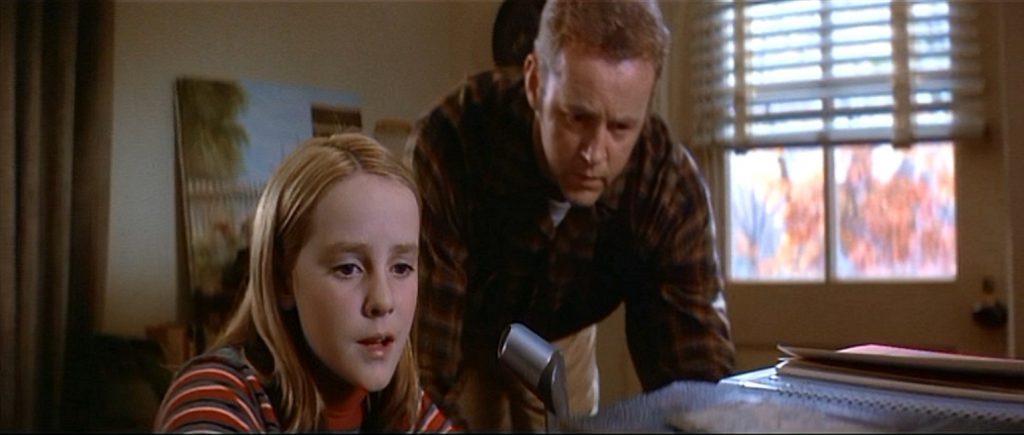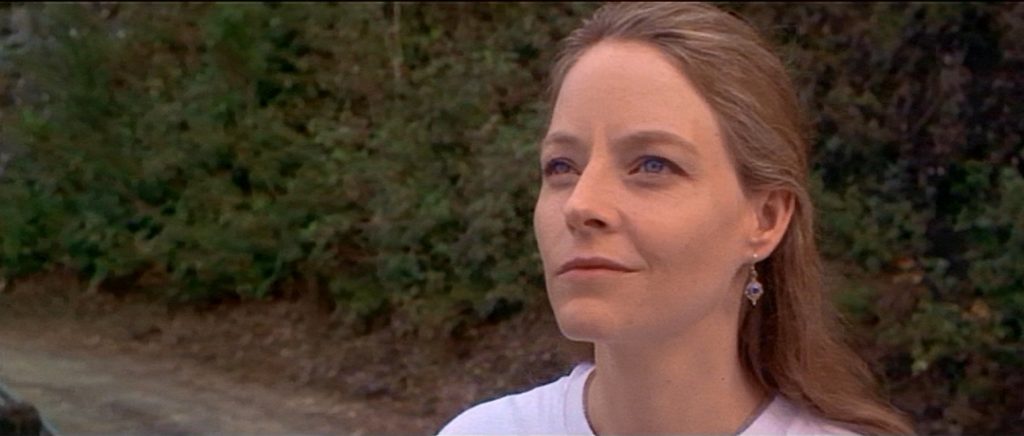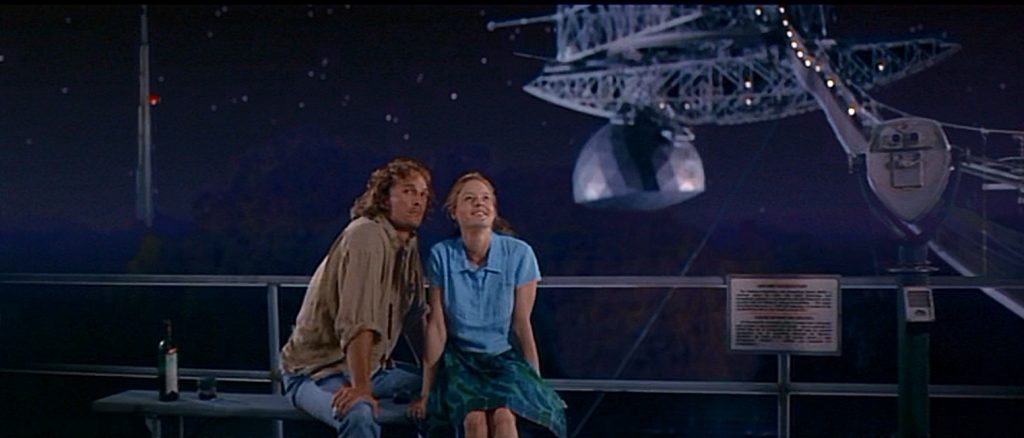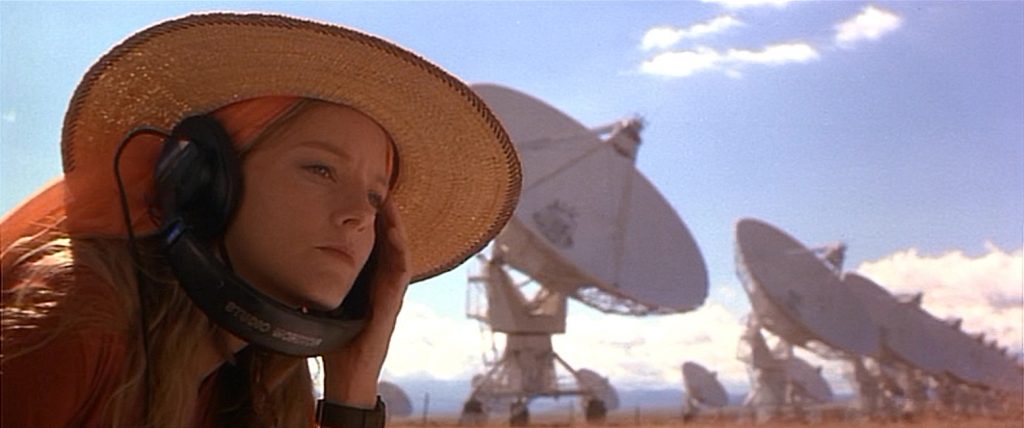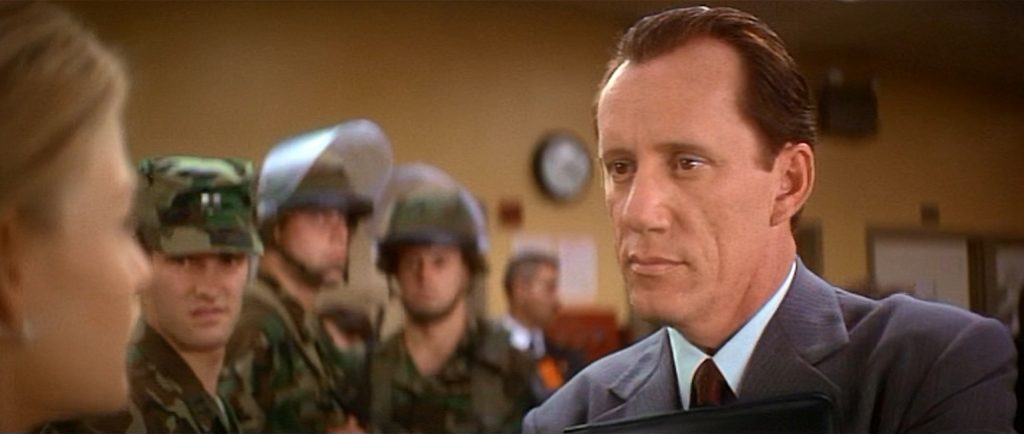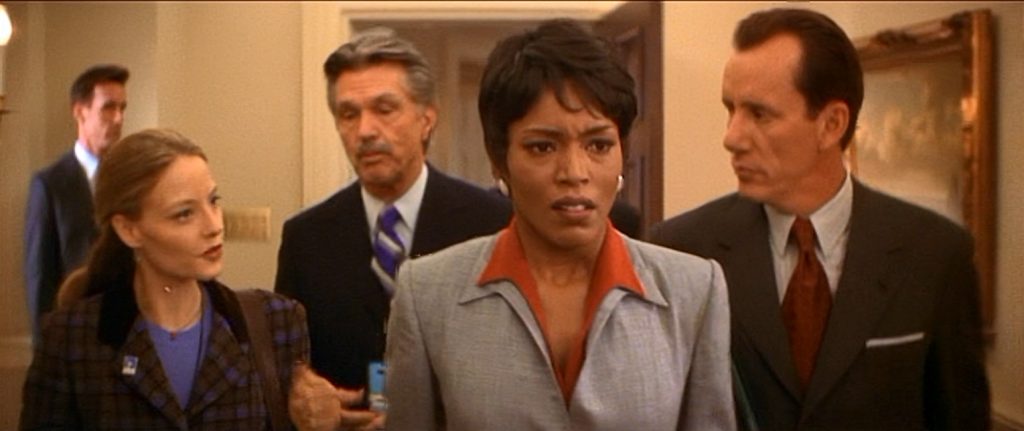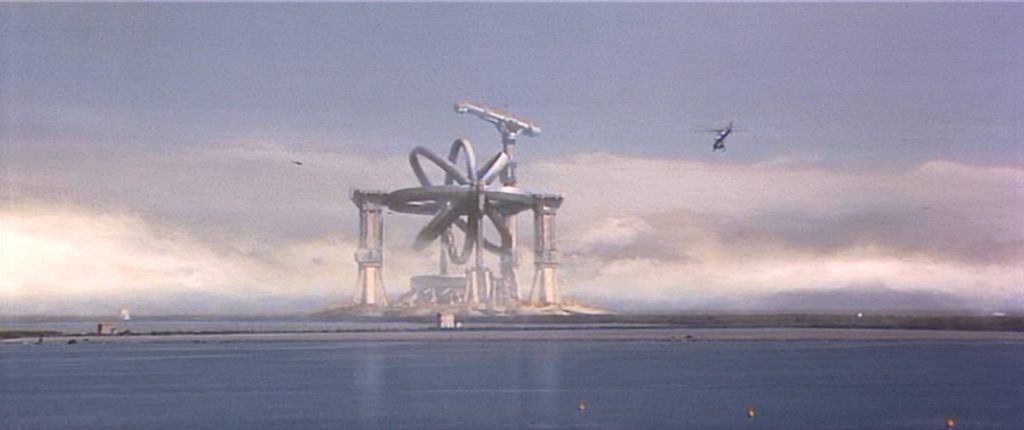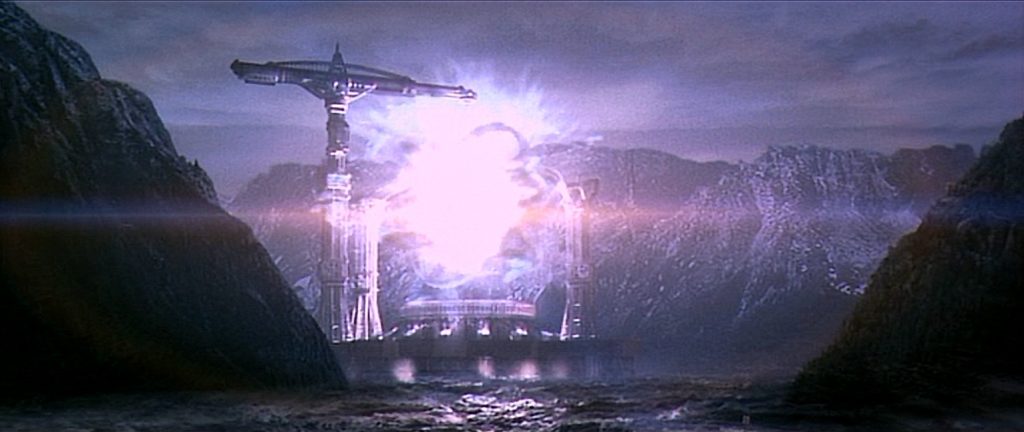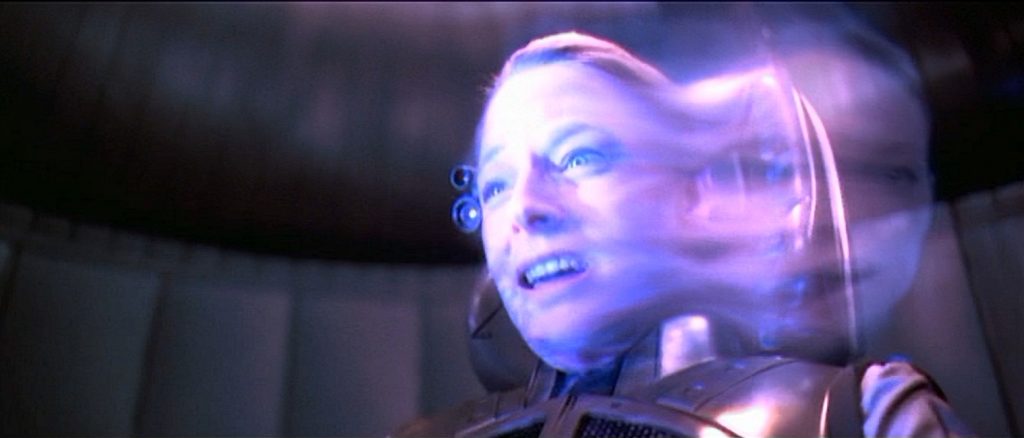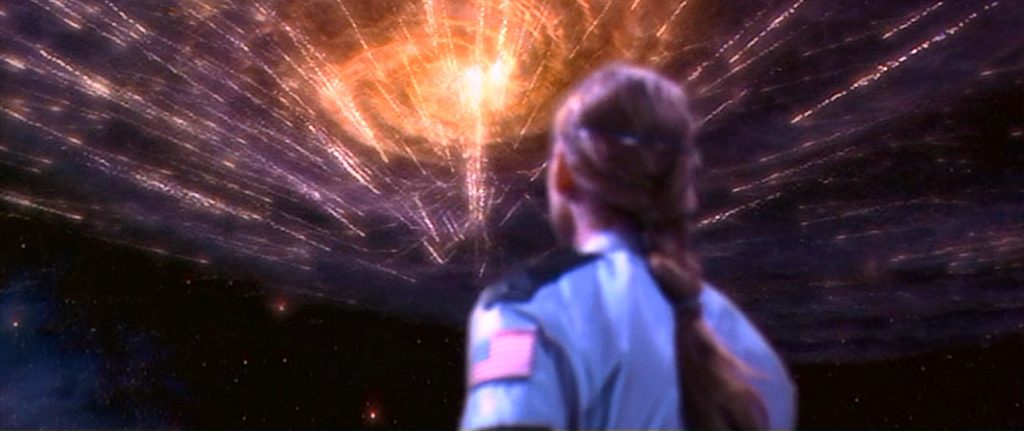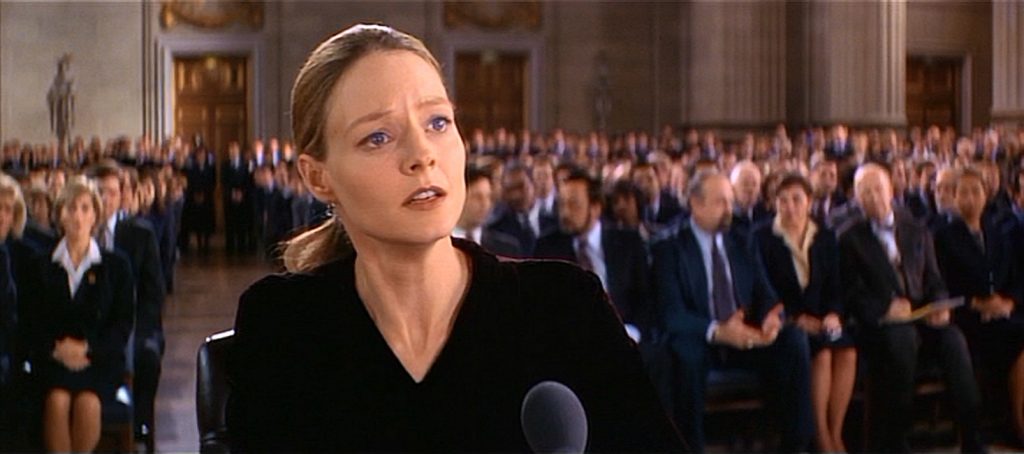Contact – 1997
Spoiler Alert
This is actually one of my top 5 favorite movies of all time. There are so many things that this film did right. The casting was spot-on, the acting was incredible, the special effects were phenomenal, the realism of the plot was undeniable, the cinematography was amazing, the musical score was perfect, the script was intelligent, and the climax was exciting. How’s that for a single movie?
I’ve seen this film over and over, and it never gets boring. Jody Foster is wonderful as Dr. Eleanor Arroway, a brilliant astronomer and scientist who is obsessed with the Search for Extraterrestrial Intelligence, or SETI. The film does a great job of developing her character so that when she finds what she is looking for, we really get to understand her actions and beliefs that propel her to the movie’s climactic ending. Foster turned in a powerful performance. In my humble opinion, it is one of the best performances of her career, and that is saying a lot.
The film also stars Matthew McConaughey as Palmer Joss, a theologian with whom Ellie falls in love. And therein lies one of the most fascinating and well-written aspects of the film. Screenwriters, James V. Hart and Michael Goldenberg, did an incredible job of looking at the hypothetical situation of human discovery of intelligent life in outer space from both points of view: scientific and religious. Each side is brilliantly explained in an easily understandable and thought-provoking way.
The film explores what would actually happen if, in our modern world, we actually found such life in the universe. How would the general populace react to it? How would religious groups react? The government? The scientific community? In the story, Ellie nearly ruins her career in her impossible search for alien life. Few people share her beliefs. But when she hears a radio signal coming from deep space, she is suddenly taken seriously.
James Woods plays Michael Kitz, the skeptical National Security Advisor who is constantly at odds with Ellie as she pursues her science-fiction-like goals. The signal that she hears is a radio signal that had left earth in 1936, traveled 26 light-years to the star constellation called Vega, and then was sent back to Earth, hugely amplified. Along with the signal is 60,000 pages of encrypted data that has to be decoded.
Ellie’s main scientific rival is David Drumlin, played by Tom Skerritt. He is one of the most frustrating characters in the film. Before the message, he was always the first to ridicule Ellie for her SETI work. After the message, he swooped in over and over again to take credit for her long years of hard work. The decoded data turns out to be blueprints for building a mysterious machine. Eventually, it is revealed that the structure is a fantastic transport device, the likes of which the world has never seen.
Again, the realism of the movie is perfect. The plot goes into how the government takes over the project and slowly squeezes Ellie out of the picture. But Ellie’s long-time benefactor, eccentric billionaire and engineer, S. R. Hadden, played by John Hurt, goes out of his way to keep her involved in what he calls “The Game of the Mellenium.”
I loved one of the philosophical arguments that the movie made. When Ellie says of the aliens, “There is no reason to believe their intentions are hostile,” Kitz responds by asking, “Why is it the position of the egghead stat that aliens would always be benign? Why is that Doctor?” She replies, “We pose no threat to them. It would be like us going out of our way to destroy a few microbes on some anthill in Africa.” Drumlin chimes in, saying, “That’s a very interesting analogy. And how guilty would we feel if we went and destroyed a few microbes on an anthill in Africa?” Things like that which were so cleverly presented just fire my imagination and make me think. Great dialogue!
The US Government decides to build the machine, and the film goes into the long and arduous process of choosing a single human to go into the transport pod, presumably to be Earth’s first ambassador to extraterrestrial life. Ellie is on the list, but once again, Drumlin crushes her dreams by taking the position for himself. But then a cult of religious fanatics, led by a man called Joseph, played by Jake Busey, become terrorists and sabotage the machine, killing Drumlin, in the process. But Hadden surprises Ellie with the revelation that he has secretly built a second machine of his own. He chooses Ellie to go.
The design of the machine itself was both fantastical and realistic, at least within the confines of the science-fiction plot. The gigantic device used spinning concentric rings that generated massive amounts of electromagnetic energy, thus opening a wormhole that would carry the transport pod across the galaxy. As Ellie was catapulted into space, the special effects went into overdrive. Her journey through the wormhole was amazingly well done. I loved how they showed ghostly images of her face emerging from her head, saying dialogue that she hadn’t yet said. And the phrase, “They’re alive!” was both exciting and ominous at the same time. It made the point that time itself was being twisted.
And the beautiful images of her journey into the unknown were spellbinding. When she finally reached her destination, the magical representation of a special place that was taken from her mind, a drawing of a beautiful beach she had made as a child, was a feast for the eyes. The glowing, crystalline water, the swaying palm trees, and the bright, sparkling sky full of stars, was just gorgeous.
Then came the part of the movie that many people didn’t like, but I loved it. The alien that came to greet her took the form of her long-dead father, played by David Morse. He spoke lovingly toward her and had a little conversation with her saying, “You’re an interesting species. An interesting mix. You’re capable of such beautiful dreams and such horrible nightmares. You feel so lost, so cut off, so alone, only you’re not. See, in all our searching, the only thing we’ve found that makes the emptiness bearable, is each other.” Wonderfully said.
But the movie doesn’t stop there. It goes on to show that as the transport pod dropped through the machine, it, in fact didn’t go anywhere. Ellie’s journey to the center of the galaxy, which was supposed to have taken about 18 hours, never took place. Kits and nearly everyone else on the planet accuse her of making up her entire experience, or at the very least hallucinating it. And you know there would be skeptics that would refuse to believe her. A public hearing is held in which she is forced to admit that she may have imagined the whole thing.
But she refuses to deny what happened. It shows how she, as a woman who has lived her entire life believing only what her senses can show her, now has to believe in her experience through unshakable faith. And that, for me is the real magic of the movie’s philosophy. It shows that there is absolutely no reason why science and religion cannot work in perfect harmony with each other, a belief I have long held to be true. It is something that I think is stated very clearly and very beautifully in the movie.
And one last aspect of the movie that I found fascinating was the fact that Kitz, who is the head of the inquiry attacking Ellie’s fantastical story, seems to be completely aware that she is telling the truth. The movie makes the point of saying that during the few seconds it took for the pod to drop through the machine, 18 hours have passed for Ellie. But two things happened in those few seconds that would seem to confirm Ellie’s story. First is the fact that the chair which had been bolted to the pod’s ceiling had been torn off and crushed against a wall. This couldn’t have happened in only a few seconds. And if it had, Ellie would not have had time to unstrap herself from the chair before it was destroyed. Second was the fact that her camera recorded over 18 hours of static footage. Kitz knew these things, yet covered up the information in what felt like a government conspiracy. You know it would happen!!
Other actors in the film who did a great job are Jena Malone, playing young Ellie, William Fichtner as Ellie’s blind co-worker Kent, Geoffrey Blake as Fisher, Ellie’s lab assistant, and Angela Basset as Rachel Constantine, the White House Chief of Staff. I also loved how they made thing even more realistic by using real celebrities playing themselves like Larry King, Bryant Gumbel, Jay Leno, and even real footage of President Bill Clinton.
And I have to mention the wonderful score by Alan Silvesrtri. It was exciting and intense when it needed to be, and yet intimate and personal at the other times. It had a grandeur about it that was perfect for the epic nature of the story. Silvestri is truly a master of his craft.
As I did my research for the movie I read about a number of different plot holes, most of which were minor enough not to be noticed by anyone but a real aerospace scientist or astronomer. But one glaring hole that I have always wondered about was the idea that Ellie used the machine to travel to the center of the galaxy, but nobody believed her. Why did they not use the machine again and send another person through to either confirm or deny her experience. I mean, here they have this multi-billion dollar piece of technology, and they don’t think to use it again to compare the results? Of course they would!
I also learned that the book that the movie is based on goes into much greater detail about the science of the fictional plot. They also explain a lot more about the aliens that Ellie encounters, and goes even further to show and confirm the presence of God in nature and outer space. As one reviewer wrote, “If you like the movie I’d recommend the book. It gives much more insight on the aliens, and expands the scope as there are a number of scientists that participate rather than just one from America, and goes more in depth into the science. It also attempts to show that religion and science can get along. My favorite part is at the very end of the book where Sagan shows how God hid a message in the very fabric of the cosmos, that we could only read when we were ready.”
It kind of makes me want to read the book now. Either way, the one catch phrase that the movie makes use of 3 times, is both profound and thought-provoking. One person would ask, “Do you believe aliens exist?” to which someone else would reply, “I don’t know. But if it is just us, it seems like an awful waste of space.”
Truer words were never spoken.
